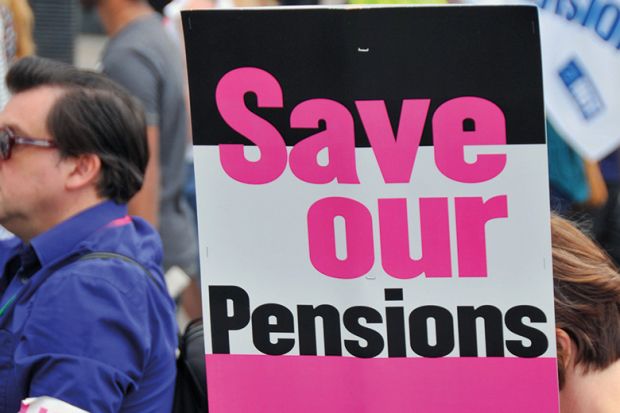Talks over controversial changes to UK higher education’s biggest pension scheme have broken up without agreement between unions and employers, clearing the way for strike action next month.
The Joint Negotiating Committee, the legally established forum for deciding changes to the Universities Superannuation Scheme, voted on 23 January in favour of Universities UK’s proposal to scrap the element of pensions that guarantees members a certain level of income in retirement.
The JNC has a joint number of UUK and University and College Union members with an independent chair, Sir Andrew Cubie. It is understood that Sir Andrew was given the casting vote after UUK and UCU representatives failed to come to an agreement.
A proposal put forward by the UCU, which would have allowed the “defined benefit” element of USS pensions to be retained, albeit with a lower accrual rate, was rejected.
The decision leaves 61 universities facing 14 days of strike action starting next month, following a ballot in which 88 per cent of participating UCU members voted to walk out over the changes.
Industrial action is set to begin with a two-day walkout on 22 and 23 February, escalating to strikes of three, four and five days in subsequent weeks. Union members will also work to contract and the UCU will conduct fresh strike ballots in the seven institutions that failed to meet the required 50 per cent turnout threshold.
UCU analysis suggests that the reforms could cut USS members' pension payouts by up to 40 per cent, although UUK's modelling suggests a smaller reduction.
Sally Hunt, UCU’s general secretary, said that the JNC vote would leave university staff feeling “utterly betrayed by their leaders”.
“Universities must be on notice that unless there are dramatic changes in their negotiators’ position then strike action will be arriving on campus next month,” she said. “Now is the time for university leaders to recognise the scale of this problem, how angry their staff are and to work with us to avoid widespread disruption in universities.”
At present, the USS operates a hybrid scheme in which defined benefit pensions can be accumulated on salaries of up to £55,550, with earnings above this threshold directed towards a defined contribution scheme, under which retirement incomes depend solely on returns from money invested in the stock market.
UUK’s proposal would move the entirety of members’ earnings on to a defined contribution model, in a bid to close a deficit that the USS estimates to be £7.5 billion. It includes a commitment to consider in three years’ time whether defined benefits can be reintroduced, should the scheme’s funding conditions improve. It also allows members to opt to contribute 4 per cent of their salary, rather than 8 per cent, while still benefiting from the 18 per cent employer contribution.
A Universities UK spokeswoman said: “The reform proposal will tackle the scheme’s deficit and the significant rise in the cost of future pensions so that universities can continue to offer attractive pensions to staff, now and in the future. It will also ensure that contributions remain affordable to both staff members and employers.
“Today’s decision is a necessary step to put the scheme on a sustainable footing for the long term.”
About 190,000 staff in mainly pre-92 institutions are members of the USS.
Register to continue
Why register?
- Registration is free and only takes a moment
- Once registered, you can read 3 articles a month
- Sign up for our newsletter
Subscribe
Or subscribe for unlimited access to:
- Unlimited access to news, views, insights & reviews
- Digital editions
- Digital access to THE’s university and college rankings analysis
Already registered or a current subscriber?















